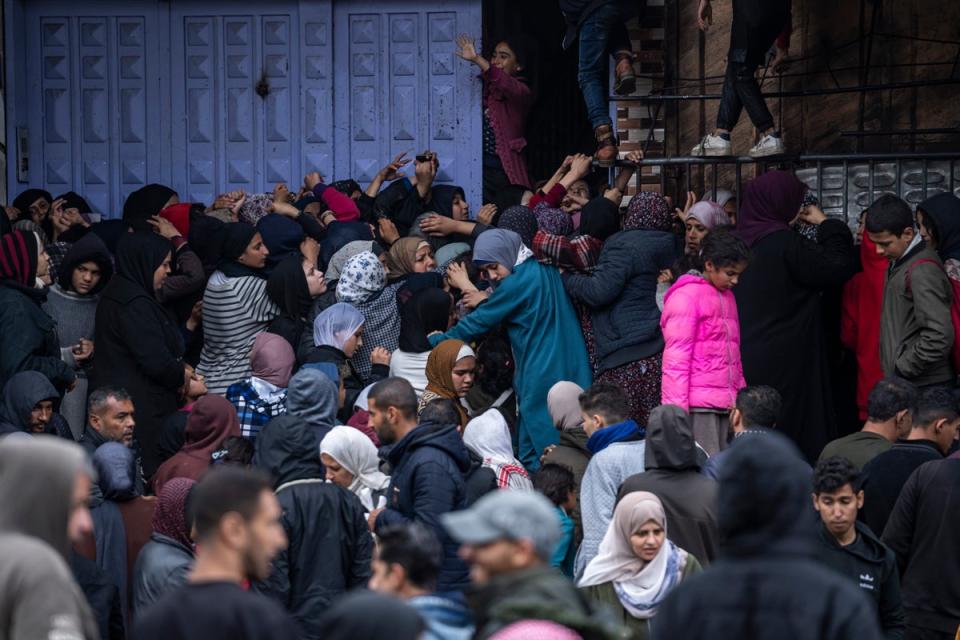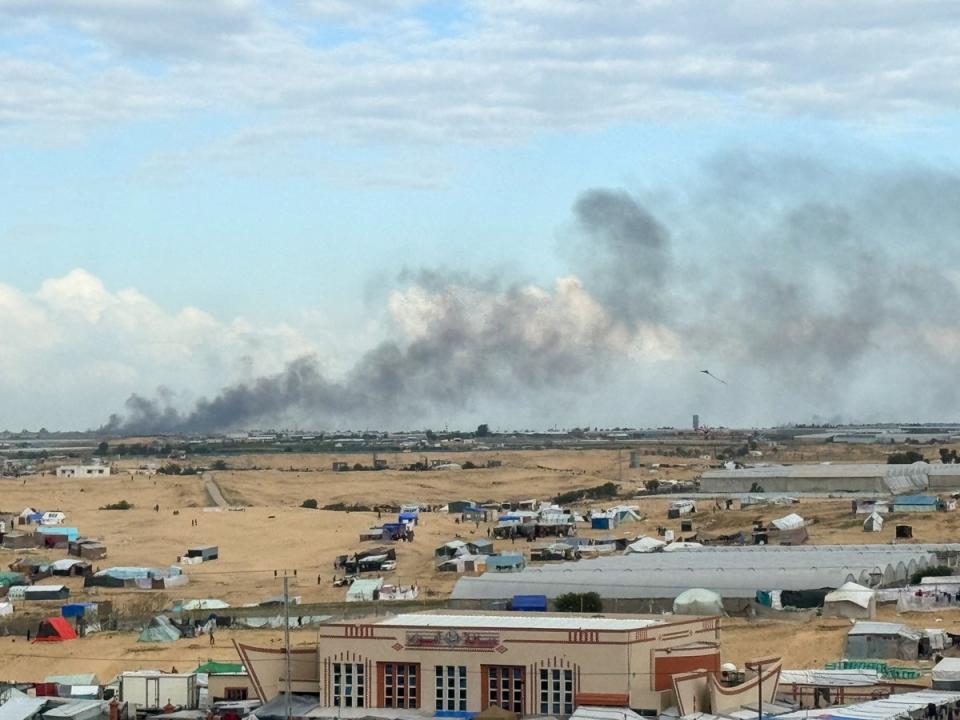Israel to begin Rafah assault unless Gaza hostages released by Ramadan
Israel has said it will begin an assault on Rafah if Hamas does not release the remaining hostages it holds in Gaza by the beginning of the holy Muslim month of Ramadan – expected to be on 10 March. It comes as the EU became the latest to warn that such an offensive would create a humanitarian disaster.
Benny Gantz, a member of Israel’s war cabinet, said: “The world must know, and Hamas leaders must know: if by Ramadan our hostages are not home, the fighting will continue everywhere, to include the Rafah area.”
Israel’s military said it had struck Khan Younis on Monday, where it has focused its war on Hamas in recent weeks. An assault on Rafah – the last refuge for Palestinians in Gaza – would mean pushing further south. Health officials in Hamas-run Gaza say that more than 29,000 people have been killed by an Israeli aerial bombardment, ground operations and a blockade that was started in response to a bloody Hamas attack inside Israel that killed around 1,200 people and saw 250 more taken hostage.
Up to 1.5 million of Gaza's population of 2.3m are now sheltering in Rafah, a city on the southern edge of the enclave. Many have fled other areas of Gaza as Israeli forces have moved south.
“An attack on Rafah would be absolutely catastrophic ... it would be unconscionable,” Ireland’s Foreign Minister Micheal Martin said before a meeting with foreign ministers from the 27 EU member states in Brussels.
After the talks ended, the bloc’s top diplomat Josep Borrell said 26 of the EU’s 27 countries agreed to a statement warning against any attack on Rafah and calling for “an immediate humanitarian pause that would lead to a sustainable ceasefire, to the unconditional release of hostages, and to the provision of humanitarian assistance”.
Mr Borrell did not name the country that did not agree to the text but diplomats told Reuters that Hungary blocked a similar statement a few days ago.

Mr Borrell said it would be impossible to prevent civilian deaths given the sheer numbers currently in Rafah. “We have to continue putting pressure on Israel to make them understand that there are so many people in the streets of Rafah, it will be impossible to avoid civilian casualties,” he said. A number of nations, including Israel’s staunchest ally the US, have warned against a military offensive inside Rafah, with Palestinians having no other place to turn.
Also on Monday, the Israeli military released footage which it said showed Israeli woman Shiri Bibas and her two small children being moved by Palestinian militants in Gaza shortly after the family was kidnapped in southern Israel in the Hamas attack on 7 October.
The security camera footage showed what appeared to be a young woman carrying a child on her shoulder as she was wrapped in a long, light-coloured covering in the yard of a building and transferred into a car. The army said the footage was recovered a few days ago and came from Khan Younis. It said the images showed Shiri Bibas as well as her sons Ariel, who was aged four when he was kidnapped, and Kfir, the youngest hostage seized, who was nine months old at the time.
“The footage shows the terrorists wrapping Shiri and her babies in a sheet, trying to hide them,” chief military spokesperson Rear Admiral Daniel Hagari told a news briefing, adding that the footage came from the day of their abduction.
“From the information available to us, we are concerned for the wellbeing of Shiri, Ariel and Kfir,” he said.
The Bibas family released a statement calling for their immediate release. “We desperately call on all decision makers in Israel and worldwide involved in negotiations: Bring them home immediately,” the family said.

It comes as 14 patients were evacuated from the last major hospital in southern Gaza, Nasser hospital in Khan Younis, which has been raided by Israeli troops. The UN agency the World Health Organisation (WHO) said over the weekend that the hospital had ceased to function following an Israeli raid. Israel’s military denies that its raid has forced the hospital offline.
“There are still more than 180 patients and 15 doctors and nurses inside Nasser,” WHO director-general Tedros Adhanom Ghebreyesus later said in a post on Twitter/X.
“The hospital is still experiencing an acute shortage of food, basic medical supplies, and oxygen. There is no tap water and no electricity, except a back-up generator maintaining some lifesaving machines,” he said, urging Israel to allow safe and sustained access to Nasser to continue lifesaving efforts.
Meanwhile, at the UN’s top court in The Hague, a week of hearings started on a request from the UN General Assembly for a non-binding opinion on the legality of Israel’s occupation of lands sought for a possible Palestinian state. The request was made to the International Court of Justice (ICJ) in 2022.
Israel captured the West Bank, Gaza and East Jerusalem – areas which the Palestinians want for a state – in a 1967 war and has since built settlements in the occupied West Bank and steadily expanded them.
Palestinian representatives asked judges to declare Israel’s occupation illegal. “We call on you to confirm that Israel’s presence in the occupied Palestinian territory is illegal,” Riyad Mansour, the Palestinian representative to the United Nations, said.
“A finding from this distinguished court ... would contribute to bringing [occupation] to an immediate end, paving a way to a just and lasting peace,” he said. “A future in which no Palestinians and no Israelis are killed. A future in which two states live side by side in peace and security.”
The ICJ’s 15-judge panel has been asked to review Israel’s “occupation, settlement and annexation ... including measures aimed at altering the demographic composition, character and status of the Holy City of Jerusalem, and from its adoption of related discriminatory legislation and measures.”
Israel is not attending the hearings but sent a five-page written statement published by the court in which it said an advisory opinion would be “harmful” to attempts to resolve the conflict because the questions posed by the UN General Assembly were prejudiced.
The judges are expected to take months to issue an opinion.
Reuters and Associated Press contributed to this report

